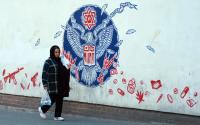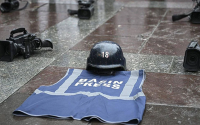Common Dreams / Published on Monday, June 4, 2007 by the Chicago Tribune
The outcome of Saturday’s referendum was never in doubt. Residents of this postcard village in the forested hills of central Bohemia voted 728-10 in favor of a resolution that directs the local municipal council to take all necessary steps to block the U.S. government from installing an anti-missile radar in their back yard.
 Josef Hruby, mayor of Zajecov and a retired ambulance driver, smiles sheepishly when he admits that there’s not much the municipality can do to stop the U.S. project, but the referendum is a fair measure of the grass-roots opposition that will greet President Bush this week as he travels to the Czech Republic and Poland to promote the missile defense shield.
Josef Hruby, mayor of Zajecov and a retired ambulance driver, smiles sheepishly when he admits that there’s not much the municipality can do to stop the U.S. project, but the referendum is a fair measure of the grass-roots opposition that will greet President Bush this week as he travels to the Czech Republic and Poland to promote the missile defense shield.
Several other villages in the vicinity of the proposed radar installation have held referendums with similar outcomes. In the Hvozdany municipality, which consists of six villages, 95 percent of voters said “no” to the radar. In Visky, 30 of the tiny hamlet’s 31 eligible voters participated in a referendum and unanimously opposed the radar.
The Bush administration’s plans for the missile defense shield call for a radar tracking station to be built in the Czech Republic and for 10 interceptor missiles to be placed in Poland. The Czech and Polish governments have signaled their support even though opinion polls in both countries show strong opposition to the U.S. plan.
The missile defense shield is supposed to protect the U.S. and much of the European continent from attacks by Iran and other “rogue states” that do not yet pose a threat. Thus far, the missile defense shield technology has not proven itself reliable. But the U.S. hopes to have the bugs worked out in a few years.
Although the Czech Republic and Poland are NATO members, the Bush administration’s approach has ruffled feathers among other NATO countries, especially France and Germany, who wonder why the U.S. appears determined to bypass NATO and instead negotiate bilaterally with Warsaw and Prague.
More ominously, Russia has taken exception to the notion of a U.S. military presence on the soil of two of its former satellites.
Secretary of State Condoleezza Rice traveled to Moscow last month to tell the Russians that they had nothing to fear from missiles on their border. The U.S. has offered to share intelligence on potential threats, but the Russians were not mollified.
Russian President Vladimir Putin last week accused the U.S. of “imperialism” and authorized tests on a new intercontinental ballistic missile and cruise missile system. On Sunday in an interview published in the Italian daily Corriere della Sera, he warned that Russia would be forced to target its own missiles toward Europe if the U.S. proceeds with its plans.
Looking to America
The eagerness of the Czech and Polish governments to sign up for the missile shield is the clearest indication yet that they view America — not the European Union or even NATO — as the ultimate guarantor of their security.
This is particularly true for Poland under the Kaczynski twins — President Lech and Prime Minister Jaroslaw. Since coming to power in late 2005, the brothers have not missed an opportunity to antagonize the Russians or provoke the Germans. Polish negotiators have said openly that they see the missile defense shield as an opportunity to strengthen bilateral military ties with the U.S.
The Czechs are only slightly more circumspect. In a recent speech, Prime Minister Mirek Topolanek said that building the American radar base on Czech territory would “complete the process” of liberation that began with the departure of the last Soviet soldier on June 30, 1991.
Martin Povejsil, a member of the Czech negotiating team, said “a concrete U.S. presence in the Czech Republic enhances the strategic importance of this country.”
But Hruby recalled the words of Vaclav Havel, the hero of Czechoslovakia’s 1989 “Velvet Revolution” and its first post-communist president, who promised that no foreign troops would ever again be invited to set foot on Czech territory.
“And now, things should be so different?” Hruby asked.
Local residents, who like to pick mushrooms and go bicycling in the deep pine forest that was a closed military zone during the Soviet era, are asking the same question.
“I was glad when we got rid of the Russians, and I don’t want to see another army come in and replace them,” said Milan Cizek, 61, a truck driver who lives in Zajecov.
“Why should we be dealing with the U.S.?” he asked. “Lately, the Americans seem to me more like an aggressor than a protector.”
‘About George Bush’
Petr Plecity, a 33-year-old telecommunications worker, said he voted no because the Czech government had failed to address the health and safety worries related to the radar installation.
“All I want is a healthy and peaceful environment for my children,” he said.
Others seemed to oppose the missile defense plan simply because a profoundly unpopular American president favors it.
“In some ways, the referendum is about George Bush and also our unhappiness about what the world became after 1989,” said Ondrej Liska, a member of the center-right ruling coalition from the Green Party. “People feel that if they sign up for the radar, they are signing up for Guantanamo.”
Some European analysts believe the real objective behind the Bush administration’s push on the missile defense shield is to thwart the EU’s fledgling effort to establish a common European defense policy.
“It is strange that one would aim to achieve [European] security by dealing with only one or two partners. Whether this is part of a strategy to ignore the multilateral approach, or just a lack of sensitivity, I don’t know, but the result is the same: a weakening of cooperation within Europe,” Liska said.
Liska, whose party holds the balance of power in the fragile ruling coalition, said he would support the missile defense shield only if it is fully integrated into NATO structures.
Lubomir Zaoralek, the shadow foreign secretary for the opposition Social Democrats, wants a national referendum on the question.
“It’s not about one radar; it a basic question about our national security. This is something we have to discuss with our public,” he said.
But the government is not about to call for a referendum it knows it would lose. Povejsil, the Czech negotiator, said that complex issues critical to the security and defense of the country should be decided by its elected leaders.
“We are not Switzerland,” he said, referring to the bastion of European neutrality where citizens retain the right to vote on all defense-related matters.






